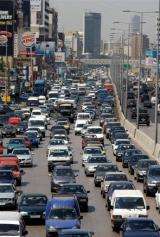Google Maps tracking traffic flow

Google has invited US motorists to share their progress -- or lack thereof -- with other drivers through the Internet giant's online mapping service linked to smart phones.
Google Maps is being enhanced this week to combine feedback from individual drivers with other traffic information to let people know which roads are likely to get them to their intended destinations the quickest.
"It takes almost zero effort on your part," Google Maps product manager Dave Barth said in a message on the California technology titan's website.
"Just turn on Google Maps for mobile before starting your car, and the more people that participate, the better the resulting traffic reports get for everybody."
Google Maps software for mobile devices will use satellite positioning features in smart phones to gather anonymous information regarding how fast people are moving along different roads, according to Barth.
"Crowdsourcing traffic gives us a way to harness bits of location data from our users and give it back to them in a form they can use to make decisions that affect their free time, their pocketbooks and the environment," he said.
Google Maps users with concerns about strangers keeping track of where they drive can opt out of the program, according to the Internet firm.
"We understand that many people would be concerned about telling the world how fast their car was moving if they also had to tell the world where they were going, so we built privacy protections in from the start," Barth said.
Information regarding vehicles remains anonymous and no records are kept regarding start and end points of journeys, according to Google.
(c) 2009 AFP


















